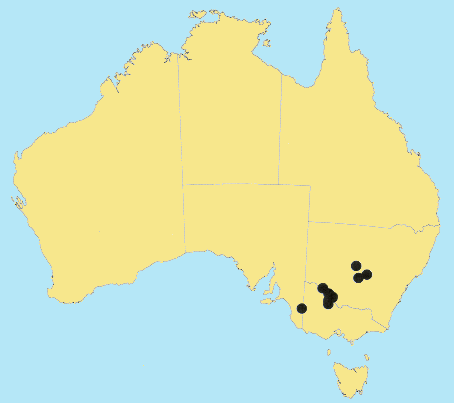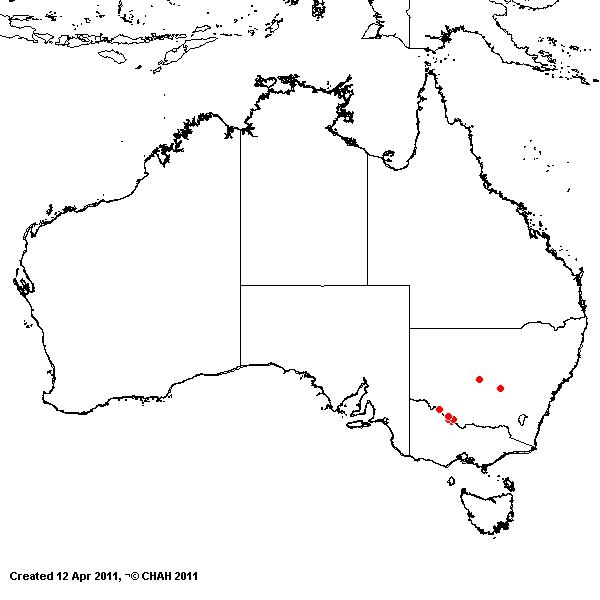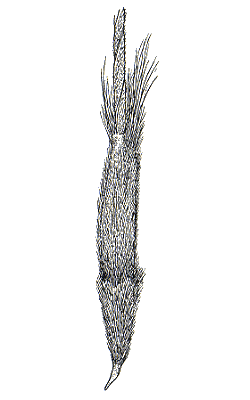Austrostipa metatoris (J.Everett &
S.W.L.Jacobs) S.W.L.Jacobs & J.Everett. Telopea 6: 587 (1996).
Classification. (GPWG 2001) : Subfamily Pooideae. Tribe Stipeae.
Basionym and/or
Replacement Name: Stipa metatoris
J. Everett & S.W.L. Jacobs, Telopea 2(4): 399 (1983).
Type of Basionym or
Protologue Information: IT: J. Everett & S. Jacobs 341, 16 Oct
1981, Australia: New South Wales (US-3267702).
Key references
(books and floras): [2002] D.Sharp & B.K.Simon, AusGrass, Grasses of
Australia, [2008] S.W.L.Jacobs, R.D.B.Walley & D.J.B.Wheeler, Grasses
of New South Wales (154), [2009] A.Wilson (ed.). Flora of Australia,
Vol 44A. Poaceae 2 (57).
Illustrations:
[2008] S.W.L.Jacobs, R.D.B.Whalley & D.J.B.Wheeler, Grasses of New South
Wales, 4th edn (154), [2009]. A.Wilson (ed.), Flora of Australia 44A:
Poaceae 2 (18, Fig. 2L).
Habit.
Perennial. Culms erect or geniculately ascending, 100 cm tall, 1.5–2.5 mm
diam., 2–3 -noded. Mid-culm internodes glabrous or pubescent. Mid-culm nodes
pubescent. Leaves basal and cauline. Leaf-sheaths glabrous on surface or hairy.
Ligule an eciliate membrane, 1–2.2 mm long, abaxially pilose, lacerate,
truncate or obtuse or acute. Leaf-blades involute, 20–40 cm long, 2–4 mm wide.
Leaf-blade surface indumented.
Inflorescence.
Inflorescence compound, a panicle. Panicle elliptic, 15–25 cm long, 3–6 cm wide.
Spikelets.
Spikelets pedicelled. Fertile spikelets 1-flowered, comprising 1 fertile
floret(s), without rachilla extension, lanceolate, terete, 16–20 mm long.
Glumes. Glumes
similar, thinner than fertile lemma. Lower glume lanceolate, membranous, much thinner
above, without keels, 3 -nerved. Upper glume lanceolate, 10–15 mm long,
membranous, without keels, 5 -nerved. Upper glume surface smooth or asperulous.
Florets.
Fertile lemma 7–8.2 mm long, without keel. Lemma surface indumented. Lemma apex
dentate or lobed, awned, 1 -awned. Median (principal) awn from a sinus, 55–65
mm long overall, with a twisted column. Column 11–25 mm long. Palea without
keels. Lodicules present. Anthers 3. Grain 3.5–4.5 mm long.
Continental
Distribution: Australasia.
Australian Distribution:
South Australia, New South Wales.
South Australia:
South-eastern. New South Wales: South-Western Plains, South Far Western
Plains.
Notes. Sandy areas of
south-western New South Wales and south-eastern South Australia.



